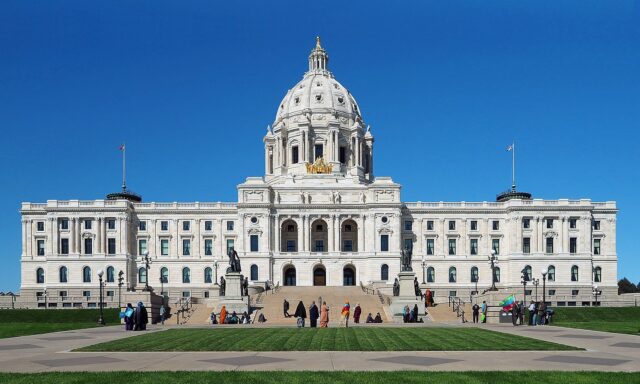By Lee Egerstrom
The 2023 Legislature closed down on May 22 after what most likely was the most successful session in Minnesota history for Native American groups, their causes, and their general well-being.
Not everything sought was accomplished. But, as Sen. Mary Kunesh (DFL-New Brighton), a leader of the Native Americans in the Legislature put it, “It’s never ‘never’.
“We’ll be back at it next year,” she added. “There will be other opportunities down the road.”
Successes ranged from a wide variety of education programs sought by Native American groups. Laws protecting Native families were passed, and there was funding for tribes in public safety and health care services, funding for Native construction projects in the state – in both rural and urban locations, and for various special legislative actions sought by Minnesota reservations.
Among these were a program to make public higher education free for Minnesota members of Native tribes and for students whose parents have combined annual incomes of less than $80,000. And, while other U.S. state lawmakers and governors are banning books, academic programs and history lessons, Minnesota ordered up increased ethnic studies.
Approving the return of Upper Sioux Agency State Park land near Granite Falls to the Upper Sioux Indian Community was “huge,” said Kunesh, a descendant of the Standing Rock Sioux Tribe.
Some other successes can also be measured for cultural importance, and not by state funding. For instance, Kunesh is pleased the Legislature granted school children permission to smudge, to wear paraphernalia at graduations, and require schools to receive permission from tribal groups before using Native images and names as mascots. Another bill pushed by Native Minnesotans in the Legislature was funding from a missing and murdered women’s program that will be supported going forward by special license plates.
Meanwhile, among natural resources legislation, Rep. Alicia Kozlowski (DFL-Duluth) got state funding ($2.3 million) for her Fond du Lac Band of Lake Superior Chippewa to reintroduce wild elk from northwestern Minnesota to reservation lands near Cloquet and Duluth.
Kozlowski, Kunesh and several other Native Americans are members of the POCI Caucus (People of Color and Indigenous) within the Minnesota Legislature. Clearly, the POCI Caucus from various ethnicities were instrumental in delivering funding for social and economic programs during the session.
At the end of the session, the POCI Caucus expressed pleasure at its successes and issued this statement:
“We are committed to creating a more just and equitable society for all Minnesotans. Everyone deserves to have the opportunity to succeed, regardless of their race or ethnicity. We have to address the root causes that perpetuate cycles of oppression, discrimination, and violence by reforming policies and investing funds in our BIPOC communities. Together we can create a more inclusive state.”
Gov. Tim Walz called the session and, what he calls his “One Minnesota Budget,” a historical achievement. Lt. Gov. Peggy Flanagan, a White Earth member, acknowledged at the budget signing that it took help and support from all across the state.
“None of this work would have been possible without our partners in the legislature, our organizers and advocates, our testifiers, our parents, our young people, and our community members from every part of the state,” she said. “This day and this victory are for you.”
Meanwhile, the Urban Indian Legacy Initiative (UILI) group of metropolitan-based Indigenous organizations had both victories and setbacks in its efforts seeking state help in building projects. It was seeking $137 million in state investments for 14 urban building and remodeling projects. It got $14.5 million for seven projects.
These included the following:
• Ain Dah Yung, $2.2 million, for remodeling and restoration of an emergency shelter on Portland Avenue and its Beverly A. Benjamin Youth Lodge on Raymond Avenue, both in St. Paul.
• Wakan Tipi (at Lower Phalen Creek Project in St. Paul), $2.5 million for reception area, classrooms, gallery, exhibit space, and cultural healing space for lifelong learning and inspiration.
• Indigenous People’s Task Force, $4 million to acquire property and develop a Mikwanedun Audisookon Center for Arts and Wellness in the Phillips Neighborhood of Minneapolis.
• Little Earth Neighborhood Early Learning Center, $1.25 million for remodeling upgrades and safety features at its site in Minneapolis.
• Little Earth Residents Association, $3.5 million, to construct an innovation hub for a greenhouse, aquaponics, a commercial kitchen and gathering space.
• Division of Indian Works, $500,000 for developing transitional housing property and for repairs of existing properties in Minneapolis.
• New Native Theater, $300,000 for designing a 200-seat theater at the Minneapolis American Indian Center.
Rep. Jamie Becker-Finn (DFL-Roseville and a Leech Lake descendant), assembled a list that included other Native groups also receiving state grants for projects or continuing support. They included:
– The Indian Health Board in Minneapolis, $4 million; the Leech Lake Wellness Center at Cass Lake, 24 million; MNI Sota Fund that supports urban Native-owned businesses and homeownership, $1 million; Native American Community Clinic, Minneapolis, $4.5 million for expansion; and Red Lake Band of Chippewa, $3 million for finishing a Red Lake Nation College site in Downtown Minneapolis.
– The American Indian OIC was seeking project funds for building new campus facilities. That did not come through, but appropriations for AIOIC ongoing programs were approved. They were $150,000 for the Takoda Institute, and $500,000 for its Adult Basic Education program.
Other urban Indigenous groups not receiving UILI project grants included Minnesota Indian Women’s Resource Center (MIWRC) for renovating housing facilities, the American Indian Community Development Corp. (AICDC) for an opioid treatment center, the Native American Community Development Institute (NACDI) to complete an acquisition in Minneapolis, a joint Oyate Ota Center envisioned for St. Paul, and Dream of Wild Health for designing and building a farm site.
Red Lake Nation College (RLNC) is shouting out “Chi-Miigwech” and praise for Rep. Heather Keeler (DFL-Moorhead and member of Yankton Sioux Tribe and Eastern Shoshone), and to her legislative colleagues who were instrumental in getting “$6M in ground-breaking bills supporting MN Tribal Colleges and Indian Higher Education.”
Kunesh served that role in the Senate where she is chair of the Education Finance Committee as well as assistant majority leader
In a statement posted on its website, RLNC called the legislation “life-changing support for the most underserved people in MN – Natives. This vital funding, along with dramatic increases to MN Indian Scholarship funds, and Emergency Funds for higher education students, means we now have more educational opportunities for Indian Country in MN.”
Editor’s note: This article was mistakenly printed in the June issue under the headlines “City of Minneapolis supports new IPTF community center”.







